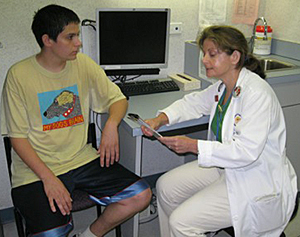What is SBIRT?
- SBIRT stands for Screening, Brief Intervention, Referral to Treatment.
- SBIRT is a comprehensive, integrated, public health approach to the delivery of early intervention and treatment services for people with substance use disorders and those at-risk of developing them.
- Primary care, trauma centers, emergency departments, and other health care settings provide opportunities to intervene BEFORE more severe consequences of substance misuse occur.
SCREENING:
Screening is a quick, simple way to identify patients who need further assessment or treatment for substance use disorders. It does not establish definitive information about diagnosis and possible treatment needs. The goal of SBIRT is to make screening for substance abuse a routine part of medical care.
BRIEF INTERVENTION:
Brief intervention is a single session or multiple sessions of motivational discussion focused on increasing insight and awareness regarding substance use and motivation toward behavioral change. Brief intervention can be tailored for variance in population or setting and can be used as a stand-alone treatment for those at-risk as well as a vehicle for engaging those in need of more extensive levels of care.
REFERRAL TO TREATMENT:
Referral to specialized treatment is provided to those identified as needing more extensive treatment than offered by the attending physician. The effectiveness of the referral process to specialty treatment is a strong measure of SBIRT success and involves a proactive and collaborative effort between SBIRT providers and those providing specialty treatment to ensure access to the appropriate level of care.
EFFECTIVENESS OF SBIRT:
There is a growing body of evidence supporting SBIRT’s effectiveness and cost-effectiveness in a variety of health care settings including trauma centers, emergency rooms, and primary care settings.
- Brief interventions and follow-up for alcohol use patterns and levels in primary care settings produces small to moderate reductions in alcohol consumption that are sustained over 6-12 month periods or longer. (Gentilello, 1999; Solberg, Maciosek, & Edwards, 2008.)
- Brief interventions when conducted in an emergency room setting lead to reduced hospital admissions, traumas and injuries up to 3 years post intervention. (Gentilello, 1999; Solberg, Maciosek, & Edwards, 2008.)
- In a recent study published in the journal Drug and Alcohol Dependence, researchers reviewed the impact of SBIRT services at various medical settings across six states over a 6 month period. Data on 459,599 patients screened for substance misuse were reviewed. The study found the following:
- An almost 68-percent reduction in illicit drug use over a 6-month period among patients who had received SBIRT services. (Madras, et al, 2009)
- Among those who reported heavy drinking at baseline, the rate of heavy alcohol use was almost 39 percent lower at the 6-month follow up. (Madras, et al, 2009)
- Those who received brief interventions or referrals to specialty treatment also reported other improvements, including fewer arrests, more stable housing situations, improved employment status, fewer emotional problems, and improved overall health. (Madras, et al, 2009)

